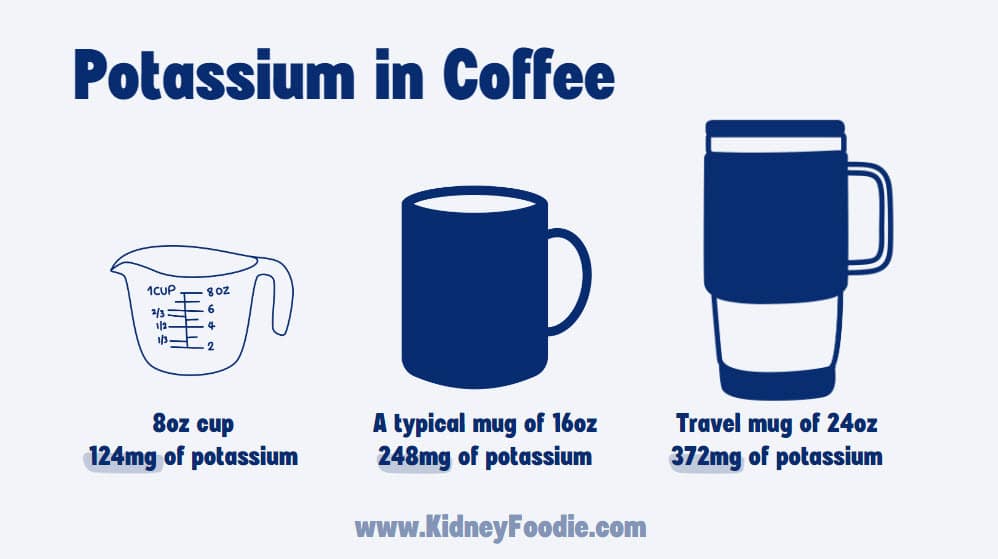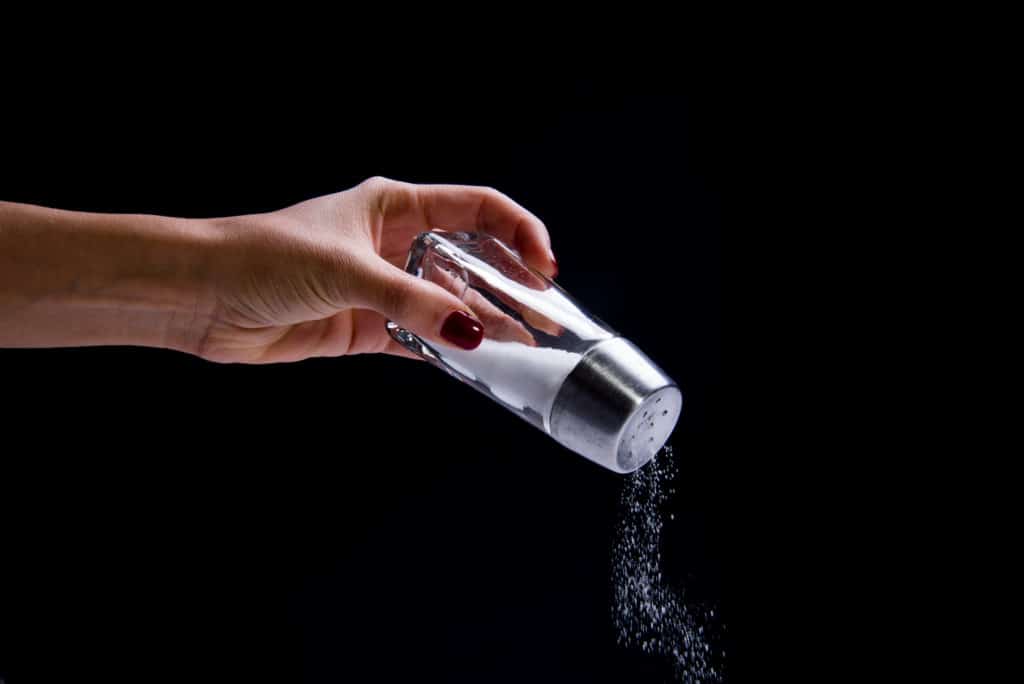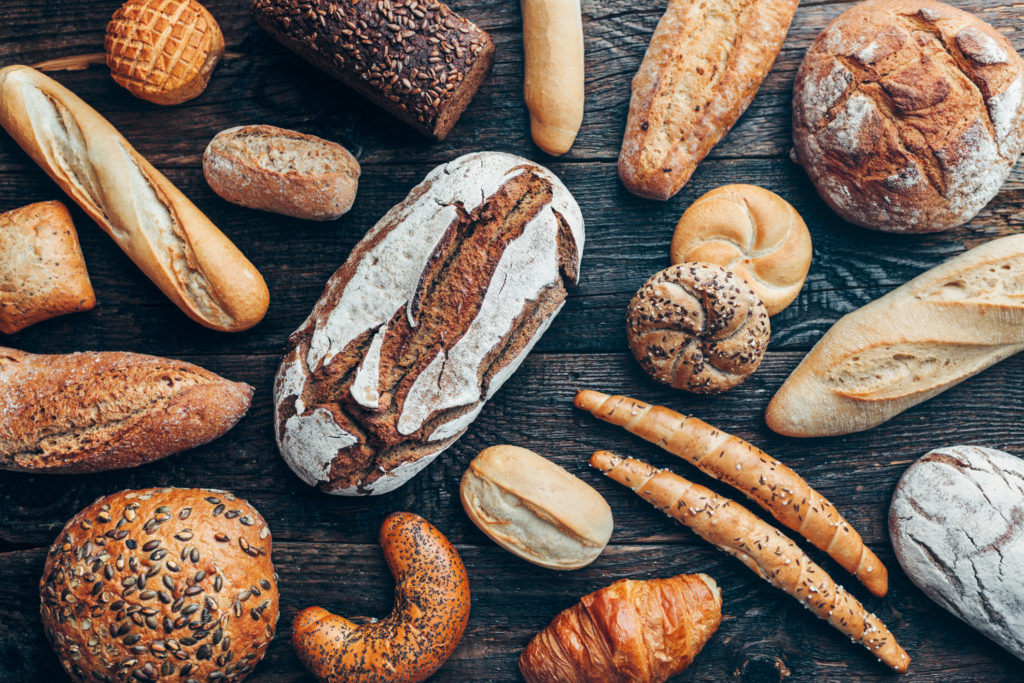Coffee can lead to elevated potassium levels under certain circumstances (that are completely avoidable).
This post may contain affiliate links through which we may earn a small commission to help keep this website free.
Table of Contents
How much potassium is in coffee?
One 8 ounce cup of coffee contains 124mg of potassium. However, many coffee mugs and insulated travel mugs can hold substantially more than 1 cup of coffee.
My coffee mugs at home comfortably hold 2 cups of coffee, which would be about 248mg of potassium.
And my travel mugs somehow hold 3 cups of coffee, which would be 372mg of potassium per mug!

Do coffee creamers add a lot of potassium?
The amount of potassium in creamers depends on the type of creamer that you use as well as how much of it you use.
- One tablespoon of heavy cream will have only 14mg of potassium
- One tablespoon of most plant based liquid creamers will have 0mg of potassium
- One tablespoon of 2% milk will have 24mg of potassium (although people who use milk in their coffee will typically use much more than just a tablespoon)
- One quarter cup of milk would add 98mg of potassium to your coffee
If you use more than the quantities listed above for creamer or milk, keep in mind that the amount of potassium coming from those additions will be higher. Milk tends to add the most potassium to coffee due to the higher potassium content and the tendency to use more of it to obtain the same taste.
Also, be sure to choose a kidney friendly creamer for your coffee. Many contain phosphorus additives which are bad for your cardiovascular system.
How does coffee raise potassium levels?
The problem with coffee is that coffee does not contain any carbohydrates or protein, so the body is not going to release insulin in response to drinking coffee. Without enough insulin, the cells of your body won’t be able to pull extra potassium out of your blood to balance out potassium levels. This can cause your blood potassium levels to rise.
How does insulin help with potassium levels?
When you eat or drink something that contains potassium, your body will first absorb that potassium into your bloodstream where it can potentially raise your potassium levels.
However, when you eat a meal that contains potassium, you are typically also eating foods that contain carbohydrates. Carbohydrates (and to a lesser extent protein) will stimulate your body to release a hormone called insulin.
Many people who are familiar with insulin think it is only important for helping your body maintain good blood sugar levels. What most people do not know is that insulin also helps to maintain good potassium levels in your body.
Insulin helps stimulate the cells of your body to remove extra potassium from your blood and slowly release it over time so that your kidneys can filter it away. Most kidneys can handle the amount of potassium in a typical diet up until a GFR of 15 (although there may be some other circumstances that can affect this).
How can you prevent high potassium levels and still enjoy coffee?
Consider the timing of your coffee and your lab draws. Drinking coffee on an empty stomach will raise your potassium levels more than if you drank your coffee with a balanced breakfast. The carbohydrates and protein from breakfast would help to stimulate insulin, which will help your body balance your potassium levels.
If you drink coffee on an empty stomach before your labs, then your potassium lab may appear higher than it normally is because all of the potassium from the coffee will have nowhere to go. Ideally, we want labs to reflect your body’s typical status and not a random high fluctuation that is due to the timing of your meals.
If your potassium levels are chronically high, then changing the timing of when you drink coffee relative to your lab draw will not truly lower your potassium levels.
If you prefer to drink coffee on an empty stomach, then consider changing your lab appointments to be later in the day after you’ve had a chance to eat a balanced meal. This will provide a more accurate picture of your potassium status.
If your potassium levels are still high, despite eating some food with your coffee or switching your lab draw to later in the day, you may need to consider other strategies to lower your potassium levels. There are many other things you can do to help manage potassium levels that do not require you to give up favorite foods or beverages like coffee. Check out our courses for more in depth information on how to manage your potassium levels.
Lastly, consider how much coffee you are drinking. A typical mug of coffee is probably not going to truly cause high potassium levels – even in someone with kidney disease. However, if you are drinking multiple mugs a day, the amount of potassium can add up. It may be worthwhile to talk with a healthcare provider about why you need so much coffee. Fatigue and lack of energy can be signs of underlying problems that can be treated.
A key strategy to a kidney friendly diet is moderation – including with coffee!


